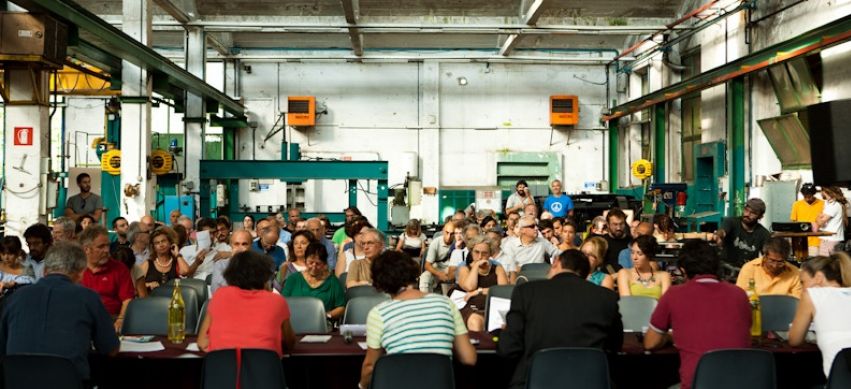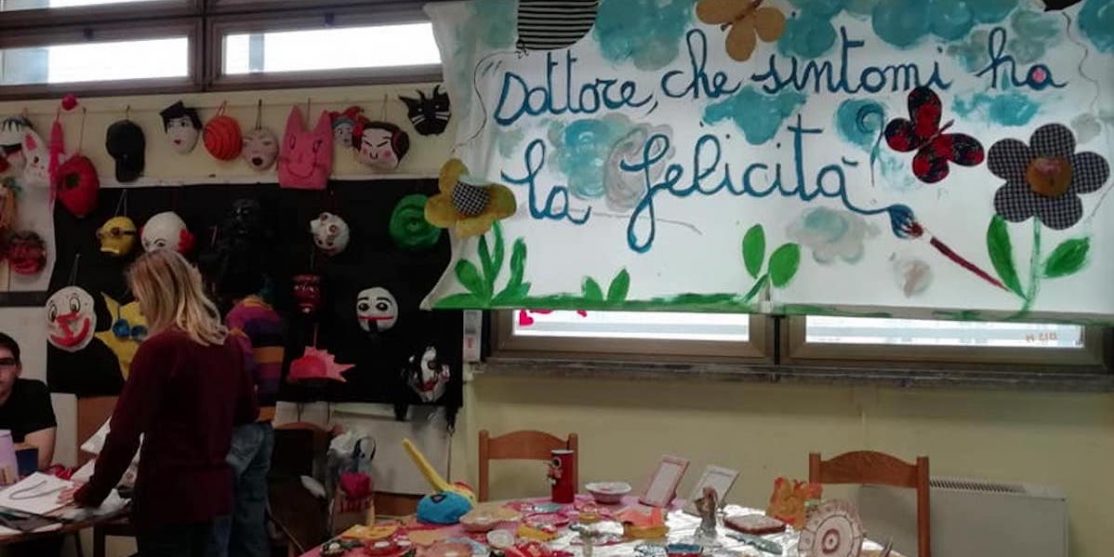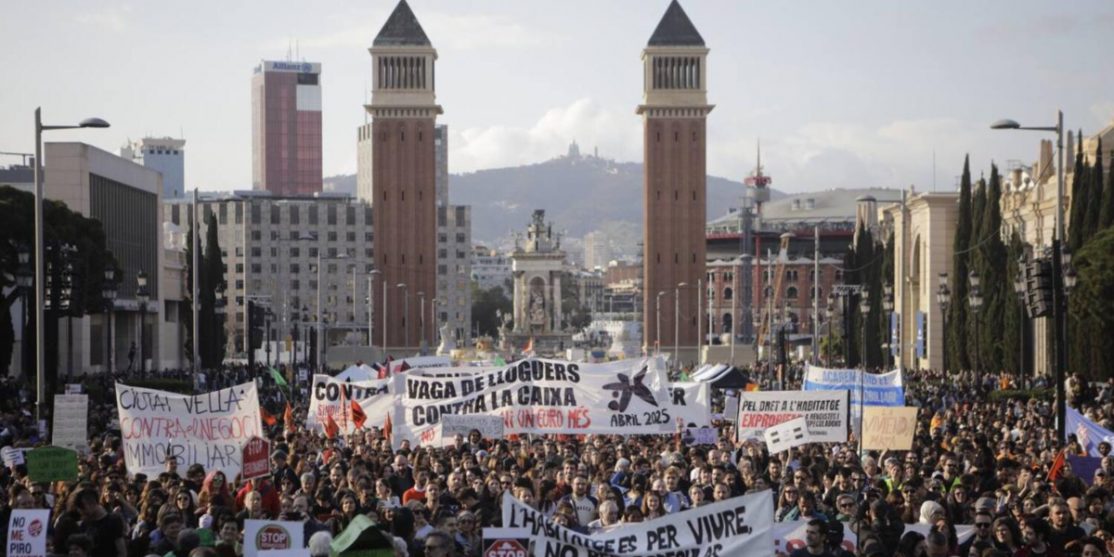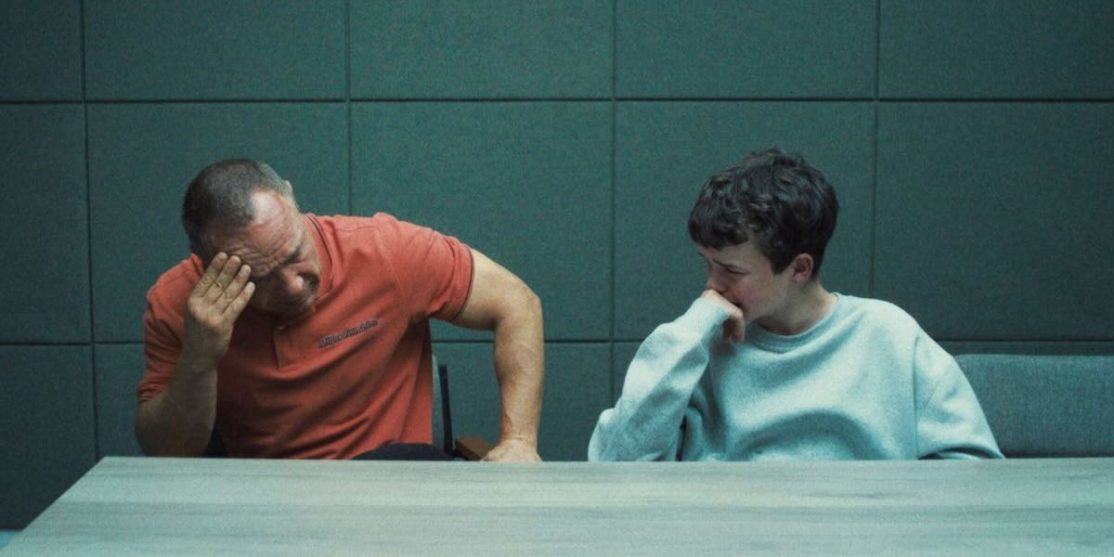COMMONS
International call. In defense and support of Officine Zero.

Facing the dramatic social and labor crisis that we live in Italy and in Europe, unexpected and brave answers are needed. Officine Zero, an occupied factory a few steps away from the Tiburtina station in Rome, is a valuable example of temporary and unemployed workers’ direct activation, to boost the economy on a new basis: cooperation, mutualism and environmental sustainability.
Officine ex-RSI (night train maintenance site, former Wagon Lits) was initially occupied on the 20th of February, 2012 by the workers that had been laid off. On the 1st of June, 2013, in response to the failure of the company decreed by the Court of Lecco, a broad social coalition, which had been supporting the workers battle all along, re-opened the factory gates with a project to reconvert it, in order to give new perspectives to the ongoing occupation.
The model that is being experimented promotes innovative projects that benefit from the cooperation between different professions and trades, from the containment of expenses that come from sharing costs and supplies of integrated services in compliance with the environmental, social and economic sustainability. At the heart of the conversion project is the implementation of an officially recognized center for re-use and preparation for re-use, where goods and waste can be given a second life, and can be subject to inspection, cleaning and repairing, to then be distributed on the second hand market, in line with the best practices at European level.
In order to optimize the recovery and use of space and equipment, on one hand, and the socio-economic value of cooperation, on the other, many other projects have been activated: workshops for craftswork, upcycling and prototyping, a co-working space for freelancers and non-standard professionals, a “chamber for self-employed and precarious work” with legal, fiscal and social security services, a student house and a canteen. Today, one year later, Officine Zero already looks like a wide space of collaborative production, where blue collars, craftsmen, freelancers and students cooperate daily. The re-generation of the space has been made possible thanks to the reactivation of the machinery, essential for running the new productions at the present date.
By September, the Trustee in the bankruptcy could tender a public auction for the sale of the machinery, with the risk that an enormous patrimony could be sold out, with no protection of the area or of the labor. For this Officine Zero needs immediate mobilization and wide support. Supporting Officine Zero means asking the institutions (the Region, Lazio and the Capital, Rome, in particular) to continue with the commitments made so far, protecting the future employment of workers and promoting the process of workers buyout, according to the principles of Article 43 of the Italian Constitution. Supporting Officine Zero at this time means to actively participate in the construction of a mutual fund, which is necessary to lay the foundations for the redevelopment of a productive and environmental common.
In Italy and in Europe examples of companies bailed out by the workers themselves and by local communities are growing, while the collaborative economy is increasingly emerging as a new paradigm of production. For this reason we invite you to sign the call and to support Officine Zero, in this challenge that is difficult, but crucial and fascinating for all of us.
To sign or for more information: oz.segreteria@gmail.com, info@ozofficinazero.org
Bruno Amoroso (Docente di Economia Internazionale – Università di Roskilde, Danimarca)
Andrés Asiaín (Economista, Centro di Studi economici e sociali Scalabrini Ortíz, Buenos Aires, Argentina)
María Inés Fernández Álvarez (Docente di Scienze Antropologiche, Università di Buenos Aires, Argentina)
Dario Azzellini (Docente J. Kepler University Linz, Austria)
Andrea Baranes (Presidente della Fondazione Culturale Responsabilità Etica, Banca Etica, campagna Sbilanciamoci!)
Aldo Barbini (Rete Onu, Cooperativa Mattaranetta, Verona)
José Goitía Bermúdez (Cumaná, Repubblica Bolivariana del Venezuela)
Piero Bernocchi (Cobas)
Lapo Berti (Presidente Ass. Cultura della Qualità, Lib21)
Sergio Bologna (Storico del movimento operaio, sociologo del lavoro, membro di ACTA)
Maria Borgese (Ballerina)
Alessandro Brunetti (Avvocato del lavoro)
José Ignacio Cabañas Magán (Segretario Generale del sindacato Solidariedad Obrera, Spagna)
Ilenia Caleo (Attrice)
Gianluca Carmosino (Giornalista, comune-info)
Antonella Carrano (Dottoranda Ingegneria, Università La Sapienza)
Luca Casarini (Freelance, Cowork Re Federico Palermo)
Alberto Castagnola (Economista)
Maurizio Cavalieri (Presidente Associazione operatori del mercato di Porta Portese)
Carlo Cellamare (Docente di Urbanistica – Facoltà di Ingegneria, Università La Sapienza)
José Luis Carretero Miramar (presidente ICEA, Instituto di Scienze economiche e dell’ autogestiione, Spagna)
Cinzia Cimini (Commercialista, Mag Roma)
Gino Clemente (Autore, regista)
Roberto Ciccarelli (Giornalista, Il Manifesto)
Vittorio Comito (Economista, Campagna Sbilanciamoci!)
Cooperativa Vio.Me (Fabbrica autogestita Salonicco, Grecia)
Cooperativa Hotel BAUEN (Buenos Aires, Argentina)
Giorgio Cremaschi (Il sindacato è un’altra cosa – Cgil)
Nazario Dal Poz (Fotografo, photoeditor)
Daniele De Michele (Don Pasta, dj gastrofilosofo)
Michele De Palma (Fiom-Cgil)
Maria Rosaria Di Martino (Mag Verona)
Monica Di Sisto (Giornalista, Fairwatch)
Marica Di Pierri (Associazione A Sud)
Ethan Earle (Rosa Luxemburg Stiftung, New York Office, USA)
Flavio Chedid Enriques (Università di Rio de Janeiro, Brasile)
Manuel Fernández (Solidaridad Obrera, Spagna)
Paolo Ferraresi (Rreuse)
Daniela Festa (Giurista)
Elio Germano (Attore)
Federica Giardini (Università Roma3)
José G. Giavedoni (Docente Facoltà di Scienze Politiche, UNR, Argentina)
Marco Augusto Gómez Solórzano (Università Autonoma M-Xochimilco, Messico)
Laura Greco (Associaizone A Sud)
Raffaele Grasso (Viticoltore)
Carlo Guglielmi (Avvocato del lavoro, Forum Diritti-Lavoro)
Jorge Gurbanov (Cattedra libera sulle fabbriche recuperate, UNLP – Università Nazionale di La Plata, Argentina)
Augusto Illuminati (Università di Urbino)
Augusto Lacala (Presidente Rete Onu, Vice Direttore Associazione Bidonville, Napoli)
Pier Paolo Leonardi (Segretario nazionale Usb)
Valeria Leonardi (Presidente associazione CLAP – Camere del lavoro autonomo e precario)
Michal Len (Direttore Rreuse)
Massimo Lettieri (Fabbrica recuperata Ri-Maflow, Milano)
Pietro Luppi (Centro di ricerca Occhio del Riciclone, Direttore Scientifico Rete Onu)
Gigi Malabarba (Fabbrica recuperata Ri-Maflow, Milano)
Rossella Marchini (Architetto, urbanista)
Sergio Marioni (Centro Culturale La Toma, Rosario, Argentina)
Carlos E. Martinez (Università Nazionale di Cordoba, Argentina)
Maria Grazia Marella (Giurista, docente Università di Perugia)
Claudio Marrucci (Poeta)
Ugo Mattei (Giurista, docente Università di California, Hastings e Torino)
Roberto Mendoza (Docente Università di Paraíba, Brasile)
Pedro Miranda (Università di Rio de Janeiro, Brasile)
Grazia Naletto (Presidente Lunaria, campagna Sbilanciamoci!)
Eduardo Olivera (Cooperativa di lavoro “Artes Grafica El Sol” Rete delle cooperative tipografiche, Buenos Aires, Argentina)
Celia Pacheco Reyes (Direttrice dipartimento di Relazioni Sociali UAM-X, Messico)
Pier Luigi Panici (Avvocato del lavoro)
Enrico Parisio (Grafico, Cowork Millepiani, Roma)
Monica Pepe (Giornalista, Zeroviolenza.it)
Fabián Pierucci (Gruppo Alavío e Ágora TV, Buenos Aires, Argentina)
Franco Piperno (Docente Università di Cosenza)
Barbara Pettine (Il sindacato è un’altra cosa – Cgil)
Piergiorgio Oliveti (Direttore Città Slow International)
Ramon Rodrigues Ramalho (Docente Università di Paraíba, Brasile)
Elio Romano (Comitato Tiburtina per uso pubblico delle caserme)
Paolo Romano (Attore)
Paola Ronzoni (Presidente Sez. ANPI Casalbertone)
Andres Ruggeri (Direttore del Programma di ricerca Facultad Abierta, Università di Buenos Aires, Argentina)
Giuliano Santoro (Giornalista)
Roberto Scacchi (Direttore regionale Legambiente Lazio)
Enzo Scandurra (Docente di Urbanistica – Facoltà di Ingegneria, Università La Sapienza)
Paula Carolina Serpe (Dipartimento di Scienze Antropologiche, UBA – Università di Buenos Aires, Argentina)
Anna Simone (Ricercatrice Sociologia del diritto – Università Roma3)
Marina Sitrin (City University di New York, USA)
Antonello Sotgia (Architetto)
Vincenzo Tersigni (Fotografo, Agenzia Eidon)
Claudio Tognonato (Docente Scienze della Formazione, Università Roma3)
Marta Tommezzoli (Mag Verona)
Jesús Torres Nuño (Tradoc – Fabbrica recuperata, Guadalajara, Messico)
Riccardo Troisi (Comune-info)
Mattea Vanini (Mag Varese)
Antonio Veneziani (Poeta)
Enrico Veronese (Mag Verona)
Guido Viale (Economista)
Marcelo Vieta (Università di Toronto, Canada)
Paolo Virno (Docente di Filosofia del Linguaggio Università di Roma Tre)
Zerocalcare (Fumettista)
Tiziana Zangani (Mag Varese)
Alberto Zoratti (Municipio dei Beni Comuni, Fairwatch)




